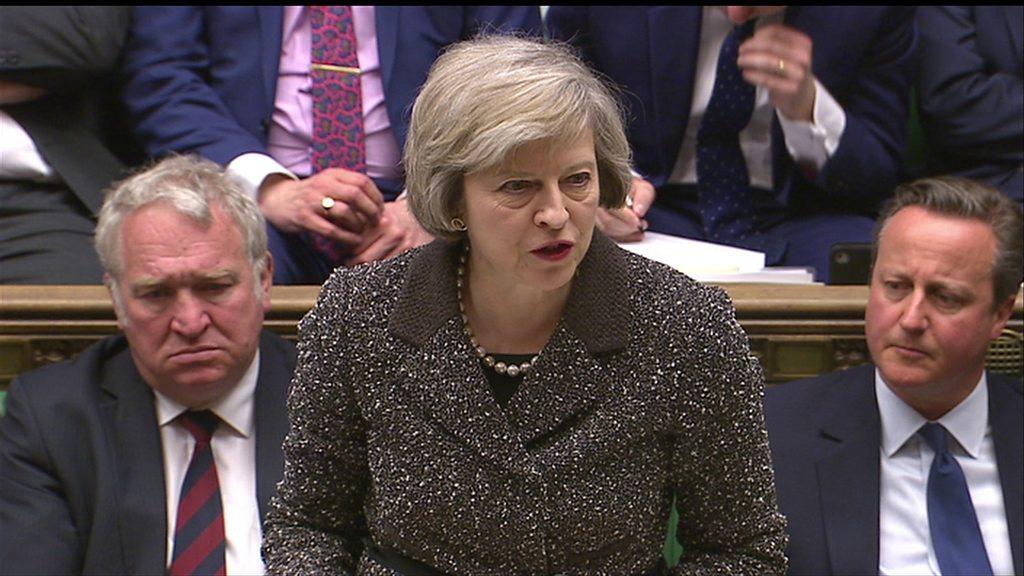South Yorkshire Police chief suspended over Hillsborough
- Published
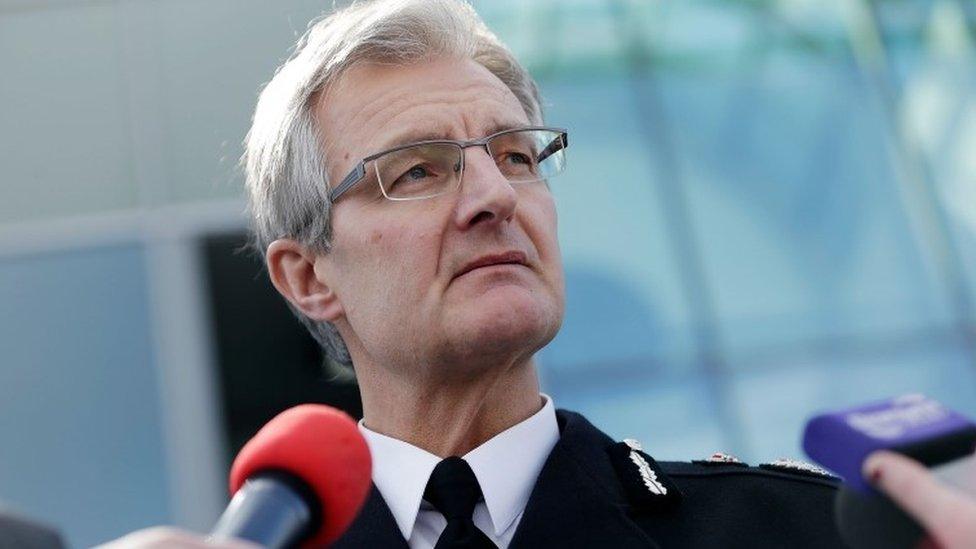
South Yorkshire Police Chief Constable David Crompton made a statement after the inquests jury returned its conclusions
South Yorkshire Police Chief Constable David Crompton has been suspended following the Hillsborough inquests.
Jurors concluded the 96 victims of the 1989 disaster were unlawfully killed and there were police failings.
Shadow Home Secretary Andy Burnham said "those responsible must be held to account" saying the force had gone back on its 2012 apology.
The force's Police and Crime Commissioner said there had been an "erosion of trust".
Dr Alan Billings said he had no choice but to act.
Police and Crime Commissioner Dr Alan Billings: "I've reached this decision with a heavy heart"
The PCC said: "The continuing criticism that has been directed at the Chief Constable and the eroding trust and confidence in South Yorkshire Police I have been left with no choice other than to suspend David Crompton from his duties.
"I have reached this decision with a heavy heart following discussions with David."
Mr Crompton was due to retire in November after four years in the role.
Hillsborough campaigner Margaret Aspinall, whose son James died in the tragedy, welcomed the suspension.
"The system, the police force of South Yorkshire, ought to be ashamed of themselves and hang their heads in shame," she told crowds gathered at a vigil in Liverpool in memory of those who died,
She added: "Let's hope that's only the beginning of what's going to happen - we have had 27 years of sleepless nights - let's hope you are getting yours now."
About 30,000 were estimated to be at the vigil, where flowers and scarves were laid on the steps of St George's Hall in the city centre.
Thousands attend a vigil in Liverpool to remember the 96 people who died in the disaster
Mr Burnham, who has backed the campaign for justice for the Hillsborough victims, had called for Mr Crompton's resignation in the House of Commons.
He said the force had gone back on its 2012 public apology following the release of the Hillsborough Independent Panel report.
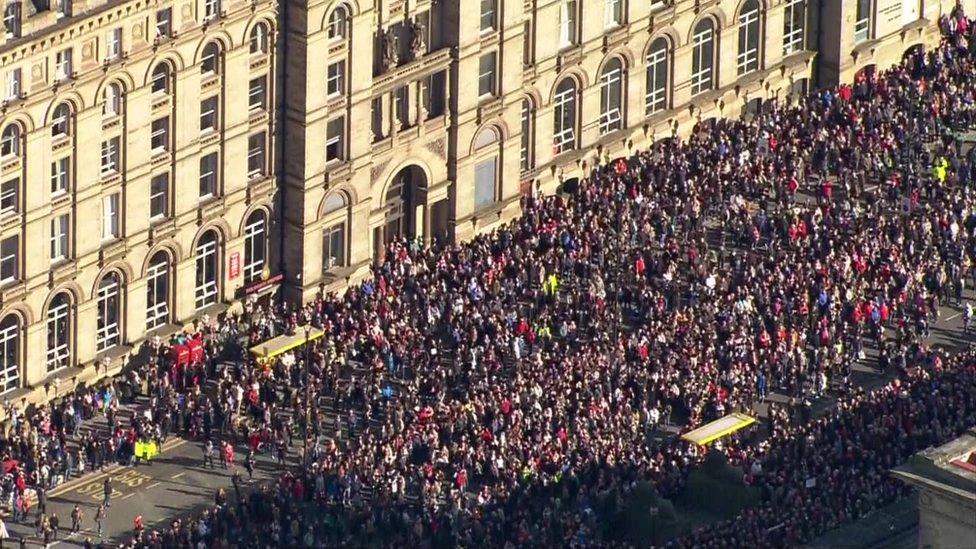
Hillsborough families were greeted with the chant Justice For The 96 at the vigil following the inquests
Mr Burnham said: "Shamefully, the cover-up continued in this Warrington court room. Millions of pounds of public money were spent retelling discredited lies.
"Lawyers for retired officers threw disgusting slurs; those for today's force tried to establish that others were responsible for the opening of the gate.
"If the police had chosen to maintain its apology, these inquests would have been much shorter."
Responding to calls for the force to be disbanded, Dr Billings said it was "too big a step".

Analysis by Danny Shaw, BBC Home Affairs correspondent
Although the PCC Dr Alan Billings suggests the decision to suspend David Crompton was triggered by reaction to the Hillsborough verdict, Mr Crompton's position has been under intense scrutiny for several years.
In 2013 he had to apologise after accusing a Hillsborough campaign group of lying. In a memo written before the Independent Panel report on the tragedy, Mr Crompton had said his force needed to be "innovative" in its media handling otherwise they'd "just be roadkill."
A year later, he came in for further criticism over South Yorkshire Police's search of Sir Cliff Richard's home, and last month a damning report revealed serious flaws in the way the force investigated child sexual exploitation.
After the report was released, Mr Crompton announced he'd be retiring in November.
Dr Billings' action could hasten the chief constable's departure but it illustrates a wider point: the power wielded by directly-elected police and crime commissioners. It is the fourth time since November 2012 that a PCC has suspended a chief constable - something that was very rarely seen under the previous system of police authorities.

Lawyers acting on behalf of the 22 of the families welcomed the suspension.
The statement from Broudie Jackson Canter said: "We hope and expect that his conduct will be subject to the rigorous and impartial scrutiny which has so long been denied to the families."
Deputy Chief Constable Dawn Copley has temporarily taken over the chief role.
In a statement, she said she had been "asked to act as Temporary Chief Constable" by the PCC "which I have agreed to do".
"This is a significant day for South Yorkshire Police.
"However, we are absolutely determined to maintain our focus on delivering the best possible policing services to the communities of South Yorkshire," she added.
Shadow home secretary Andy Burnham said he blamed South Yorkshire Police's "leadership and culture, which seems rotten to the core"
In 2012, Mr Crompton admitted "grave errors" were made during the Hillsborough disaster and has apologised "profoundly".
On Tuesday after the inquests conclusions were delivered, he admitted the policing of the match was "catastrophically wrong" and "unequivocally" accepted the findings.
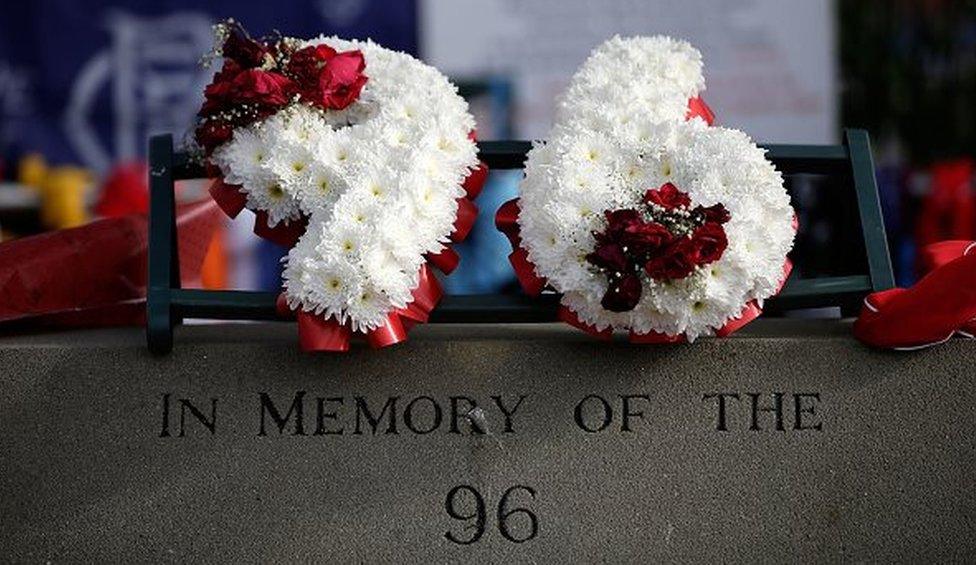
Tributes are being left at Hillsborough stadium following the conclusion of the inquests
Hours before his suspension, the force said: "We have never sought, at any stage, to defend the failures of South Yorkshire Police or its officers.
"Nevertheless, these failures had to be put into the context of other contributory factors. In other words, where do the failings of SYP stand in the overall picture?
"We are sorry if our approach has been perceived as at odds with our earlier apology, this was certainly not our intention."
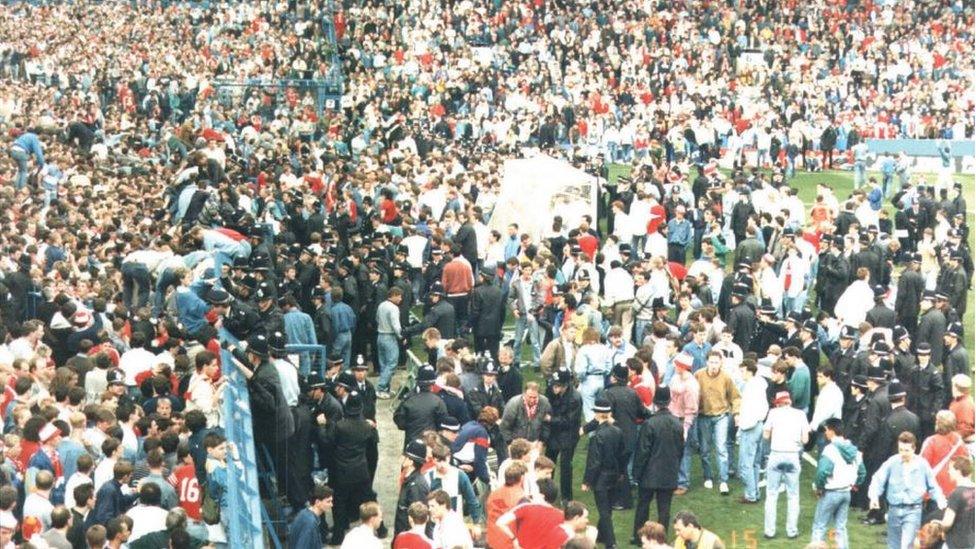
The jury was shown pictures of fans in the Leppings Lane end of the stadium as the disaster unfolded
Home Secretary Theresa May has praised the "extraordinary dignity and determination" of the Hillsborough families.
She said for 27 years the families and survivors "fought for justice from the authorities that should have been trusted, and have laid blame and tried to protect themselves."
The families "have never faltered", she said, and commended their courage, determination and resolve.
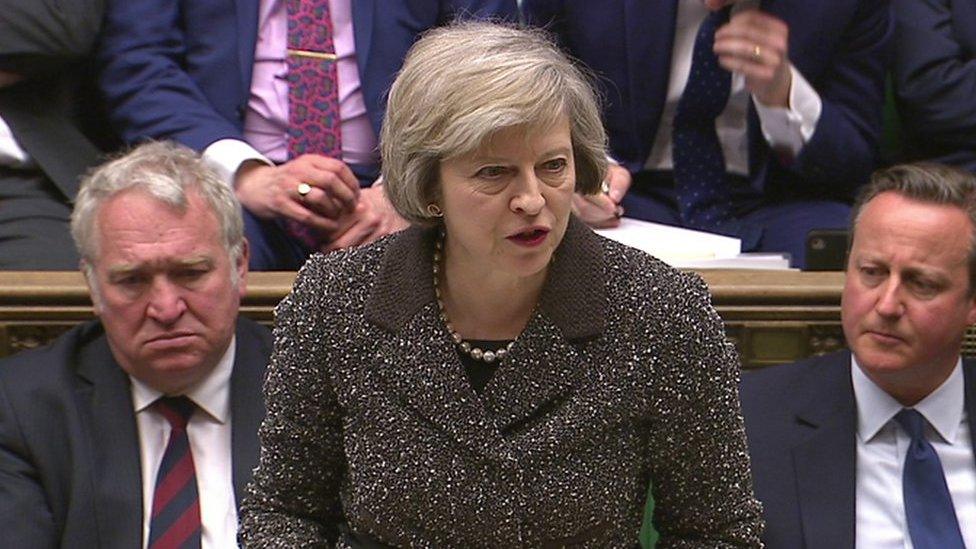
Theresa May said potential offences under investigation included gross negligence manslaughter,
The fans died as a result of a crush during an FA Cup semi-final between Liverpool and Nottingham Forest at Sheffield Wednesday's stadium on 15 April 1989.
Mrs May said the jury found that blunders by South Yorkshire's police and ambulance services "caused or contributed to" the deaths as a result of the disaster.
The jury also concluded that Liverpool fans were not to blame for what happened.
She read out the potential offences under investigation including gross negligence manslaughter, misconduct in a public office, perjury and perverting the course of justice.
John Joyce, 72, who was at Sheffield Wednesday's ground on the day of the disaster, said like the families of the dead, he too wanted to see the police prosecuted.
"From day one they were at fault. They called us robbers, pickpockets and everything. Rubbish. They switched the statements, it's been hard. I was at the game, I was in the stands, that's why I have lived with it for 27 rotten years," he said.
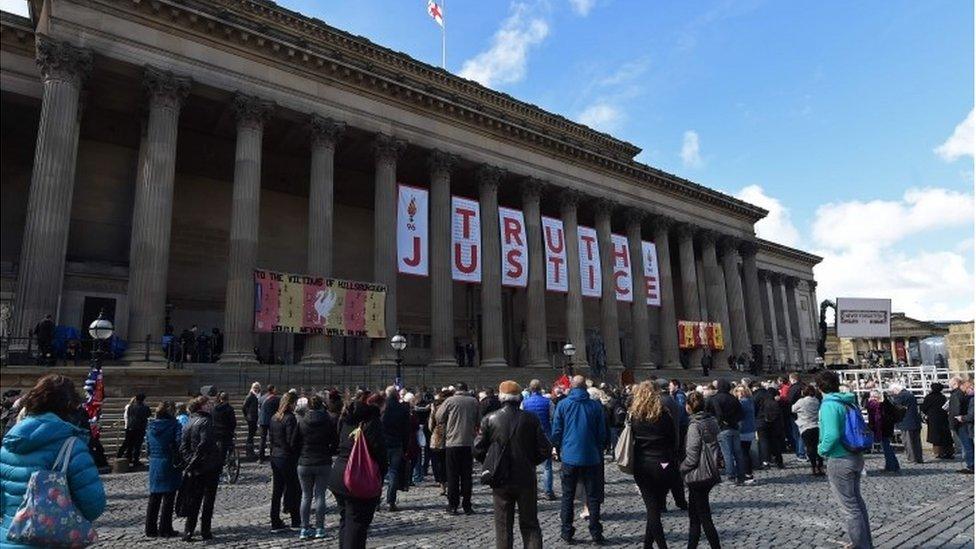
Tributes have been laid at St George's Hall the inquests ended
The inquests jury heard more than two years of evidence at Britain's longest running inquests.
Nine jurors reached unanimous decisions on all but one of the 14 questions at the inquests into UK's worst sporting disaster.
The coroner Sir John Goldring said he would accept a majority decision about whether the fans were unlawfully killed - seven jurors agreed they were.
- Published27 April 2016
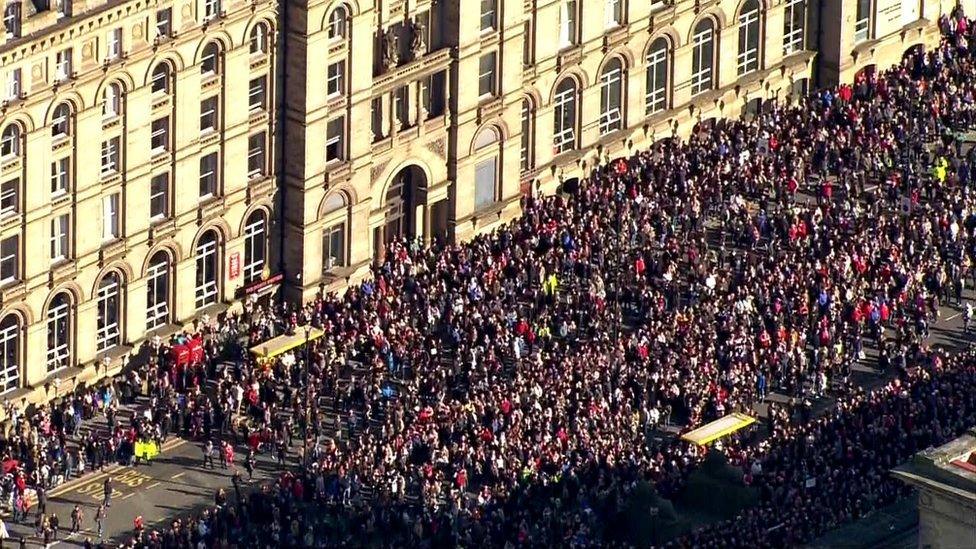
- Published27 April 2016
